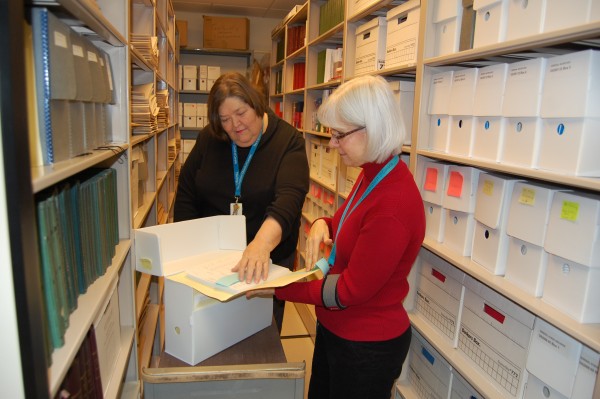
Archivists at the Anglican Church of Canada have completed the digitization of paper records related to Indian residential schools, marking a major step forward for the church’s work with the Truth and Reconciliation Commission (TRC).
Nearly 300,000 digitized pages held by the church have now been submitted to the TRC for transfer to the National Research Centre for Truth and Reconciliation (NRCTR) at the University of Manitoba, established under the TRC mandate to serve as a permanent resource for Canadians to learn the history of the residential schools.
Of the scanned pages, approximately half were held in the archives of General Synod, which also held records from the Diocese of the Arctic and the Diocese of Keewatin. The remainder were taken from the archives of 30 Anglican dioceses across Canada.
General Synod Archivist Nancy Hurn, who co-ordinated the digitization effort, noted the importance of making records available for survivors to understand the church’s role in this part of Canadian history and to promote reconciliation and the self-determination of indigenous peoples.
“It’s what the church needed to do to at least give the indigenous people a piece of their history because we took so much of it away,” Hurn said.
“The more we can help them understand the truth through the records,” she added, “the better they can understand their own experience, as horrific as it was.”
Between 1820 and 1969, the Anglican Church of Canada operated roughly three dozen residential schools for aboriginal children across the country.
In collecting paper records from the period, archivists and researchers spent five years combing through records held by all national church organizations that contributed to work at the residential schools.
By finding crucial documents such as registers of burial, archivists were able to help relatives of students learn about the fates of loved ones, who in some cases never returned home.
“I’ve probably had at least a dozen experiences of individuals who have been searching for people their whole life,” Hurn said.
She offered the example of a woman whose brother died during a 1940 epidemic at a residential school, saying a priest’s diary helped shed light on the circumstances surrounding the death and funeral.
In addition, church records represent a vital resource for residential school survivors seeking financial compensation for attendance and abuse.
Putting the submitted records in context, NRCTR director Ry Moran said the centre had obtained residential school records from 32 Anglican entities (encompassing General Synod and dioceses across the country), compared to 54 Catholic entities, 13 United Church entities, one Presbyterian entity and 20 government departments, amounting to nearly four million records in total.
“The Anglican General Synod happens to [have] one of the largest collections of those materials, but there are a number of other fairly significant Anglican collections across the country,” Moran said.
While Hurn estimated that the church has now submitted 90 per cent of its records to the TRC—which include thousands of photographs, electronic documents and emails—some additional work remains to be done
In advance of the release of the TRC report in June 2015, General Synod archivists aim to complete the submission of the balance of digital records and audio-visual material and to present a report on access and duplication to the Anglican Council of Indigenous Peoples.
Hurn noted the supportive role played by church leaders throughout the process.
“No one has ever said to me, ‘No, this isn’t part of that story,’” she said. “Whatever we’ve had, we’ve made available.”
Interested in keeping up-to-date on news, opinion, events and resources from the Anglican Church of Canada? Sign up for our email alerts .
